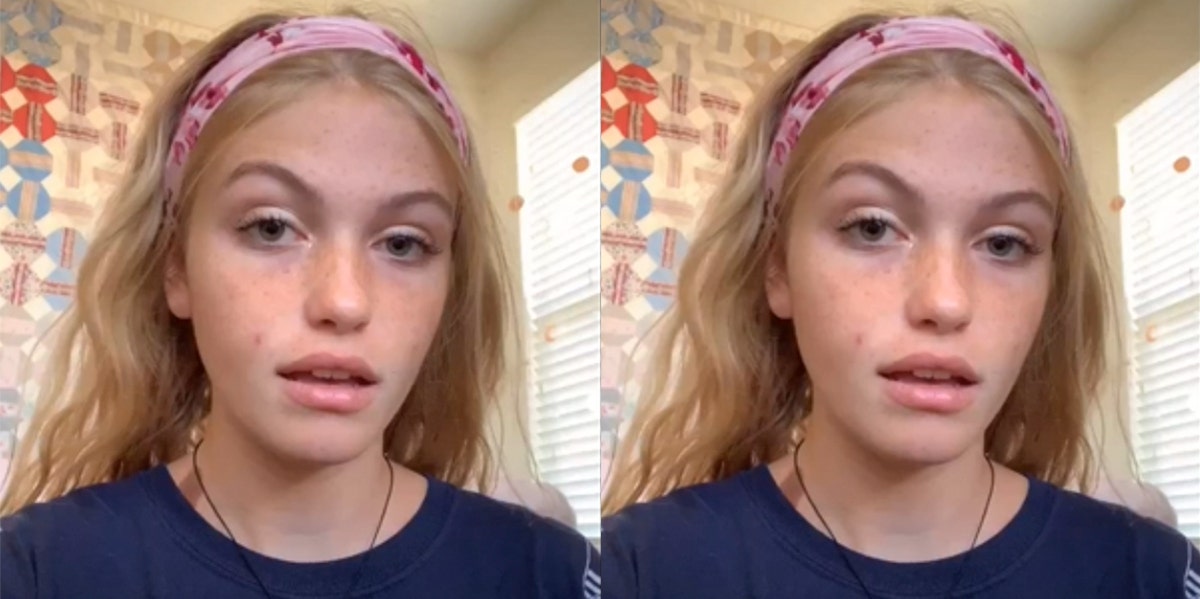The Viral Math Girl From TikTok Perfectly Encapsulates What It’s Like To Be Female Online
A telling portrait of feminism on the internet.
 TikTok
TikTok I was browsing Twitter, as I try to avoid doing too much these days, and I came across a viral video (12.1 million views) shared by @aleturner, saying it was the dumbest one she’d ever seen.
I was intrigued. In it, a young blond woman applied makeup for work while discoursing freely on how the concept of mathematics came to be. She asked questions like, “Who came up with this concept?” and “How would you start on the concept of algebra?”
The initial reaction was one of mockery. People were quick to dismiss her and call her and her video “dumb.” Simply because she was young, blonde, and said “like” and “stuff” a lot, commentators determined that her questions were invalid and that the education system should have done a better job of explaining math to her.
First of all, the questions she was asking were actually very good. Philosopher and math college professors themselves have said that her questions were valid, the subject of a great deal of discussion, and even have had entire college courses and documentaries created around them.
But secondly, and more importantly, I don’t think there’s anything wrong with asking questions you don’t know the answers to. It’s not stupid to wonder about the things that make you curious — it’s just a sign that you want to learn. Whether or not the question is valid, I think it’s terrifying that people are so quick to jump on a sign of wanting to know more as a negative. How else do we learn?
Why Do We Hate Teen Girls So Much?
The flavor of hate Gracie Cunningham, accidental TikTok star, got was a very specific breed: the kind we display for One Direction fans, for Twilight stans, for pumpkin latte drinkers. The kind that only rears its head when a young woman expresses her opinions. I remember when I was a kid in school, I had a visceral fear of showing I liked “girly” things — pink, sparkles, selfies.
Anything that was tied to female teendom was uncool. Likewise, the patterns of speech favored by young women are, typically just by association, deemed lesser. People who say “like” a lot are seen as more unintelligent, for example.
“I’m imagining a very memorable dialect that I’m sure we’re all familiar with, oftentimes (and, perhaps, erroneously) associated with Caucasian females who enjoy the taste of pumpkin-flavored coffee,” says Roland Kratt, on the subject of if saying “like” too much is a sign of lesser intelligence.
The research backs me up: Women’s thoughts and contributions are more likely to be scorned, even when they’re just as valid as their male counterparts.
Gracie’s video encapsulates everything that’s wrong about how we view teen girls. She asked valid questions, that actual philosophy professors don’t have answers for, that entire movies have been created about. But her questions weren’t seen as deep or worthy of consideration. She was just a dumb teenage girl, putting on makeup and asking foolish questions.
Ultimately, Gracie, aka Math Girl, had her comeuppance: She went viral (and her second video went viral, too) with most people in her corner. Despite the fact that the comment that rocketed her to temporary stardom was that the video was “the dumbest ever,” people got over the fact that she was a young girl on the internet.
It showcases two problems. First, to be young and female and doing just about anything, whether it’s enjoying music, a book, a drink, or asking questions about things we don’t understand, is nearly universally hated. People think it’s OK to pile on horrible comments online for the slightest cause, and Gracie’s video is an example of that. What could these trolls gain by crapping on her and her ideas? What did they benefit from? Nothing other than minimizing the opinion of a young woman.
Secondly, it really underlines the problem we, as a society, have with the problem of perception. As soon as you ask a question, it’s a weakness to be exploited or mocked, instead of a totally valid way to express curiosity and potentially learn something new.
It doesn’t have to be too deep — it was a one-minute TikTok video where a girl pontificated on the origins of math. I don’t think she wanted to be hailed as a mathematical and philosophical genius.
But I’m glad Gracie is the internet’s new hero, and I’m glad she’s asking questions about math. It actually inspired me to do some reading on the topic, and as a result, I know more about Pythagoras’ theorem and the leading hypotheses on what causes the origin of math as we know it. I’ve come out on top, and hopefully, so has our viral TikTok Math Girl. I’m glad there was such a backlash to the original reception. And I hope more girls and women take this as an encouragement to speak their own minds, too.
The way we treat women online, mocking them for their interests or thoughts, has got to stop.
Zulie Rane is a freelance content creator, MSc by research and psychology nerd. She/her.

